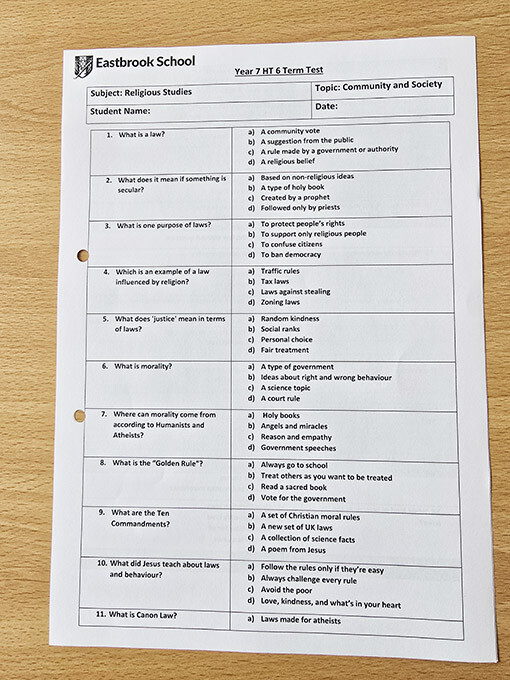Assessing Progress in Religious Studies: The Role of Multiple Choice Questions and End-of-Unit Tests
Religious studies is a complex and multifaceted subject that requires a comprehensive assessment approach. Multiple-choice questions (MCQs) and end-of-unit tests are two common assessment tools used to evaluate student progress. This article explores how these assessments help monitor student progress in religious studies.
Benefits of MCQs in Religious Studies
1. Efficient assessment: MCQs allow teachers to assess a large number of students quickly and efficiently.
2. Objective evaluation: MCQs provide an objective measure of student knowledge, reducing bias and subjectivity.
3. Identifying knowledge gaps: MCQs can help identify specific areas where students need improvement.
Benefits of End-of-Unit Tests in Religious Studies
1. Comprehensive assessment: End-of-unit tests provide a comprehensive assessment of student knowledge and understanding.
2. Critical thinking and application: End-of-unit tests can include essay questions and case studies that assess critical thinking and application of religious concepts.
3. Progress monitoring: End-of-unit tests help teachers monitor student progress over time, identifying areas of strength and weakness.
Feedback and Assessment
To provide effective feedback, teachers use a range of strategies, including:
Green Pen Feedback
1. End-of-unit test feedback: Teachers use green pen to provide feedback on end-of-unit tests, highlighting areas of strength and weakness.
2. Targeted feedback: Green pen feedback is targeted and specific, providing students with clear guidance on how to improve.
Model Answers
1. Guiding student understanding: Model answers provide students with a clear understanding of what is expected in their responses.
2. Improving student performance: By comparing their answers to model answers, students can identify areas for improvement and develop their skills.
How MCQs and End-of-Unit Tests Help Monitor Progress
1. Tracking student performance: Regular MCQs and end-of-unit tests provide a record of student performance, allowing teachers to track progress over time.
2. Identifying areas for improvement: These assessments help identify specific areas where students need additional support or review.
3. Informing instruction: The results of MCQs and end-of-unit tests can inform instruction, helping teachers adjust their teaching strategies to better meet student needs.
MCQs and end-of-unit tests are valuable tools for assessing student progress in religious studies. By providing an objective measure of student knowledge and understanding, these assessments help teachers identify areas for improvement, track student progress, and inform instruction. The use of green pen feedback and model answers further supports student learning, providing targeted guidance and promoting student progress.


